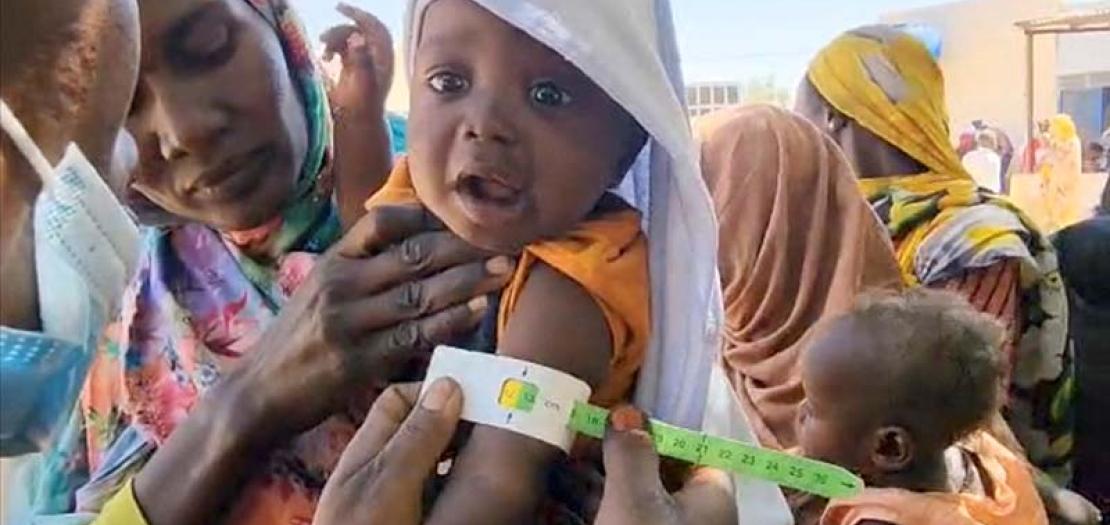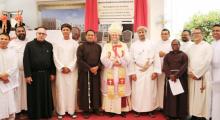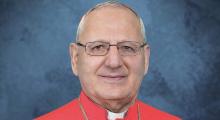Issued by the Catholic Center for Studies and Media - Jordan. Editor-in-chief Fr. Rif'at Bader - موقع أبونا abouna.org

As a paramilitary group announced the capture of el-Fasher, the besieged capital of Sudan’s North Darfur state, Catholic Church leaders amplified calls for the protection of “forgotten” civilians — including thousands of children — trapped in the western Sudanese city.
On Oct. 26, the paramilitary Rapid Support Forces and its allies announced the capture of the main army base, and technically the city, after an 18-month deadly siege. The paramilitary forces had intensified bombings, heavy artillery and drone attacks, forcing the army to retreat from the base.
260,000 civilians are trapped
Around 260,000 civilians — including 130,000 children — remain trapped in the area’s main camp for internally displaced people, enduring desperate conditions without aid, according to the United Nations and Catholic Church agencies.
“It is a forgotten war because the people are really forgotten,” Italian Bishop Christian Carlassare of Bentiu in neighboring South Sudan told OSV News.
“Unfortunately, it’s a forgotten war for the international community, but it’s not forgotten for the weapon merchants, who are making a lot of profits out of this war,” he cried out.
In an Oct. 29 appeal, the U.N.’s Office for the Coordination of Humanitarian Affairs, best known as OCHA, warned of a dramatic escalation of violence in and around el-Fasher, “condemning in the strongest terms reported attacks by the Rapid Support Forces against civilians, civilian infrastructure and humanitarian workers.”
Reports of executions, sexual violence
Credible reports “point to widespread violations, including summary executions, house-to-house raids, sexual violence, and attacks along escape routes preventing civilians from reaching safety,” OCHA said.
Meanwhile, the World Health Organization’s director general, Tedros Adhanom Ghebreyesus, said in an Oct. 29 X post that “WHO is appalled and deeply shocked by reports of the tragic killing of more than 460 patients and companions at Saudi Maternity Hospital” in el-Fasher, following “recent attacks and the abduction of health workers.”
Prior to this latest attack, WHO has verified 185 attacks on health care in Sudan with 1,204 deaths and 416 injuries of health care workers and patients since the start of the conflict in April 2023.
Attacks on health workers, patients
“Forty-nine of these attacks occurred this year alone, killing 966 people,” Ghebreyesus said in his post. “All attacks on health care MUST STOP immediately and unconditionally,” he continued, and patients, health personnel and health facilities “must be protected under International Humanitarian Law.”
UNICEF, the U.N. children’s agency, said children in el-Fasher were starving because the agency’s lifesaving nutrition services were being blocked.
“Blocking humanitarian access is a grave violation of children’s rights and the lives of children are hanging in the balance,” said Catherine Russell, UNICEF’s executive director.
During the siege, the paramilitary forces did not allow food aid and medicines into the city and its gunmen shot dead any civilians trying to flee. Dozens died in the indiscriminate bombardment and from starvation and a cholera outbreak, while humanitarian agencies warned that the paramilitary was using starvation as a weapon in the blockade.
Appeal by Comboni Missionaries
“We cannot accept what is happening in el-Fasher. While the international media are silent about Sudan, we cannot forget,” said an appeal for Sudan by the Comboni Missionaries on October 17.
“Dozens of women, men and children have already lost their lives due to lack of food,” the Comboni Missionaries said.
According to Father Abdallah Hussein, vicar general of the El Obeid Diocese, which includes the Darfur region, the blockade had made it extremely difficult to reach el-Fasher or get information from the city.
“These days, there is no communication. There is no network. I do not have information about el-Fasher,” he said when asked to give an update on the situation.
5.4 per cent of population is Christian
Islam is the predominant religion in Sudan, accounting for 91 per cent of the 48 million people. Of the rest of the population, 5.4 per cent are Christians and 2.8 per cent follow Indigenous religions, according to the 2022 Report on International Religious Freedom by the U.S. Department of State.
The current war pits the Sudan Armed Forces — the national army led by Gen. Abdel Fattah Al-Burhan — against the paramilitary Rapid Support Forces under Mohammed Hamdan Dagalo, known as “Hemedti.” The war began on April 15, 2023, and since then, thousands of people have died in the conflict.
An estimated 9 million Sudanese are internally displaced, while nearly 4 million have fled across the border to settle as refugees in the neighboring countries — including Chad, Egypt, South Sudan and the Central African Republic.
Exploiting natural resources
Bishop Carlassare said the fighting faction and their backers were now exploiting natural resources, especially gold, to fund the war.
“We are witnessing the exploitation of these resources to continue the conflict. They are stealing twice from the people. They are stealing peace and then the natural resources,” he told OSV News.
According to the bishop, the church could make the Sudanese situation more and more known, especially since the people are living in misery, suffering poverty and lacking most basic services.
He said Bishop Yunan Tombe Trille Kuku Andali of El Obeid has been traveling around Europe in recent days, testifying on the atrocities in Sudan, especially the tragic situation in Darfur.
Hoping for Vatican diplomacy
“I hope the diplomacy of the Vatican can bring the people together, and especially to speak for those that are most abandoned,” Bishop Carlassare said.
In Nairobi, Father Andrew Kaufa, a member of the Montfort Missionaries, who serves as communications coordinator for the Association of Member Episcopal Conferences in Eastern Africa, or AMECEA, said the regional bishops were very concerned about the situation in Sudan.
“They have discussed how they can visit the country physically to express solidarity with the bishops and the remaining Christians. They will also continue to pray for the country and issue messages of solidarity,” Father Kaufa told OSV News.







